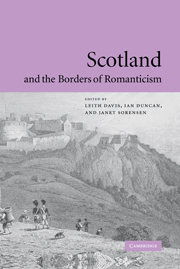Book contents
- Frontmatter
- Contents
- List of contributors
- Acknowledgments
- Introduction
- 1 Coleridge, Hume, and the chains of the Romantic imagination
- 2 The pathos of abstraction: Adam Smith, Ossian, and Samuel Johnson
- 3 Antiquarianism, the Scottish Science of Man, and the emergence of modern disciplinarity
- 4 Melancholy, memory, and the “narrative situation” of history in post-Enlightenment Scotland
- 5 Scott, the Scottish Enlightenment, and Romantic Orientalism
- 6 Walter Scott's Romantic postmodernity
- 7 Putting down the Rising
- 8 Joanna Baillie stages the nation
- 9 William Wordsworth and William Cobbett: Scotch travel and British reform
- 10 Burns's topographies
- 11 At “sang about”: Scottish song and the challenge to British culture
- 12 Romantic spinstrelsy: Anne Bannerman and the sexual politics of the ballad
- 13 “The fause nourice sang”: childhood, child murder, and the formalism of the Scottish ballad revival
- Index
12 - Romantic spinstrelsy: Anne Bannerman and the sexual politics of the ballad
Published online by Cambridge University Press: 22 September 2009
- Frontmatter
- Contents
- List of contributors
- Acknowledgments
- Introduction
- 1 Coleridge, Hume, and the chains of the Romantic imagination
- 2 The pathos of abstraction: Adam Smith, Ossian, and Samuel Johnson
- 3 Antiquarianism, the Scottish Science of Man, and the emergence of modern disciplinarity
- 4 Melancholy, memory, and the “narrative situation” of history in post-Enlightenment Scotland
- 5 Scott, the Scottish Enlightenment, and Romantic Orientalism
- 6 Walter Scott's Romantic postmodernity
- 7 Putting down the Rising
- 8 Joanna Baillie stages the nation
- 9 William Wordsworth and William Cobbett: Scotch travel and British reform
- 10 Burns's topographies
- 11 At “sang about”: Scottish song and the challenge to British culture
- 12 Romantic spinstrelsy: Anne Bannerman and the sexual politics of the ballad
- 13 “The fause nourice sang”: childhood, child murder, and the formalism of the Scottish ballad revival
- Index
Summary
The late eighteenth-century ballad revival, inspired by Thomas Percy's Reliques of Ancient English Poetry (1765) and taken to a new level of scholarly ambition in Walter Scott and John Leyden's Minstrelsy of the Scottish Border (1802–3), helped shape canonical Romanticism's developing theories of genius, primitivism, and authenticity. The ballad revival was particularly significant in Scotland because “the influence of the ballad was – and is – the strongest continuing influence in Scottish poetry.” Not only is the ballad central to the tradition of Scottish literature, but Scottish literature as a whole is central to the historical development and theorization of Romanticism, as this volume bears witness. Scottish poetry profoundly impacted what has until recently been considered “English Romanticism” not only through the vibrant oral Scots tradition popularized by Burns, but also in the heroic bardic tradition of Ossian. Macpherson's role in constructing a national epic is analogous to the Scottish ballad collectors' role in reconstructing a body of national literature in the wake of the failed 1745 rebellion. Macpherson fabricated a national tradition, while antiquaries like Scott, Ramsay, Leyden, and Jamieson attempted to reconstruct one in their ballad anthologies, complete with an elaborate scholarly apparatus designed to authenticate (and safely historicize) the ballads' primitive passions and heroism.
Percy's Reliques also inspired a revival of interest in distinctly English poetry, a nationalist celebration of stylistic “simplicity” (as opposed to German sensationalism) culminating in Wordsworth's claims for a new poetry based on simplicity, authenticity, and passion in the Lyrical Ballads.
- Type
- Chapter
- Information
- Scotland and the Borders of Romanticism , pp. 204 - 224Publisher: Cambridge University PressPrint publication year: 2004
- 1
- Cited by



